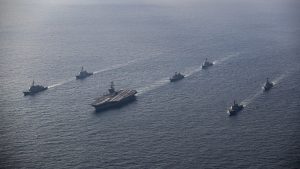Kim Yo Jong, the powerful sister of North Korean leader Kim Jong Un and the main voice on inter-Korean relations, issued a statement on Sunday, expressing Pyongyang’s hostile stance against the upcoming joint military drills between South Korea, the United States, and Japan from September 15 to 19.
“If the present rulers have sympathized with the dangerous ‘idea’ cooked up by the former rulers and put it into practice with full consideration given to it, we will regard it as an unfiltered ‘demonstration’ of their anti-DPRK confrontational stand and ‘succession’ of confrontational policy,” Kim said in her statement published by North Korea’s state-controlled Korean Central News Agency on September 14. (DPRK is an acronym of North Korea’s official name, Democratic People’s Republic of Korea.)
Kim did not specify which rulers she was referring to in her statement. All three countries involved – Japan, South Korea, and the United States – have new leadership since last year’s iteration of the drills.
Both the South Korea-U.S. Combined Nuclear and Conventional Integration tabletop exercise, dubbed as Iron Mace, and the trilateral South Korea-U.S.-Japan military drills, known as Freedom Edge, will be carried out this week.
Despite South Korean President Lee Jae-myung’s pragmatic overtures toward North Korea, his government appears to be strengthening military cooperation with the U.S. as North Korea’s ties with Russia have been enhanced following Pyongyang’s explicit support for Russia’s invasion of Ukraine. The Lee administration is unlikely to reduce the scale of the extensive joint military drills with the U.S. due to the North’s steady ambition to build up advanced nuclear weapons and its clear intention to take an anti-U.S. stance by building up trilateral coalition with China and Russia in the region.
“I remind the U.S., Japan and the ROK that the reckless show of strength made by them in real action in the vicinity of the DPRK, which is the wrong place, will inevitably bring bad results to themselves,” Kim Yo Jong said. (ROK is an acronym of South Korea’s official name, Republic of Korea.)
Since the breakdown of the 2019 Hanoi summit between U.S. President Donald Trump and Kim Jong Un, North Korea has taken clear steps to construct a “two-state” system on the Korean Peninsula. Overturning decades of policy, Kim Jong Un declared that his country has no interest in “reunification” with South Korea, which was labeled a “hostile state.” Pyongyang has also ruled out the possibility of employing its nuclear weapons as a bargaining chip in negotiations with other countries, even with the United States.
Trump recently expressed his intention to have a meeting with Kim again, but Pyongyang appears to have no interest in renewing the deadlocked nuclear talks unless Washington makes concessions first.
Blaming Seoul and Washington for leaving it no choice but to build up more weapons for its safety, Pyongyang’s hawkish statements over Seoul and Washington’s military drills will likely work as justification for upcoming missile tests. That could include tests of inter-continental ballistic missiles, submarine-launched ballistic missiles, or other strategic nuclear weapons that would raise high alarm in the United States.
North Korea’s strategy to increase and consolidate its leverage in the region by strengthening ties with Russia and China for forming a trilateral anti-U.S. cooperation. Lee, as he already acknowledged, will likely face growing challenges in creating a Korean Peninsula where the two Koreas don’t need to fight against each other.

































